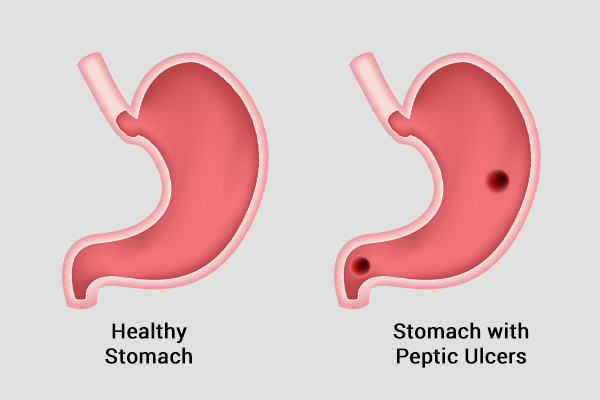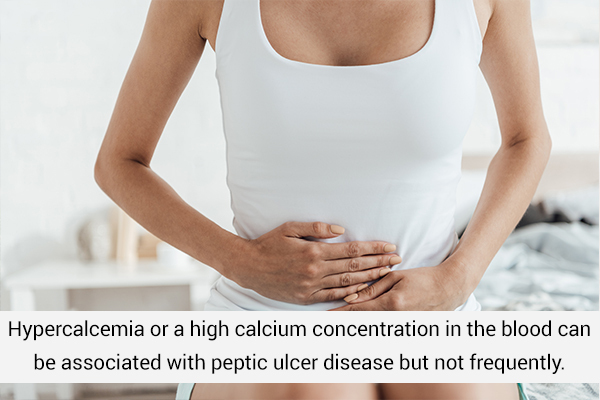In this article:
Stomach ulcers or peptic ulcers are a general term referring to an open sore or defect in the lining of the stomach (gastric ulcers) or the beginning part of the small intestine called the duodenum (duodenal ulcers) and sometimes even inside of your throat or food pipe (esophageal ulcers). (1)

Peptic ulcers are similar in appearance to canker sores in the mouth but are usually larger.
They usually develop due to the corrosive effect of the various gastric secretions inside your stomach that enable digestion, such as the digestive acid called bile and the hormone pepsin. (2) These caustic fluids burn the inner lining of the gut, causing ulcers.
Causes of Peptic Ulcers

Here are some common factors that can trigger excessive stomach acid production and lead to peptic ulcer disease: (3)
- The risk of developing peptic ulcers is highest in people with a Helicobacter pylori infection or nonsteroidal anti-inflammatory use (including aspirin) and increases with age. (4) The presence of both of these risk factors increases the risk further. The risk of developing peptic ulcer disease in the general population is approximately 1/1000, with the majority of patients not having symptoms. (5) If symptoms are present, they include abdominal discomfort or pain, nausea, vomiting, gastrointestinal bleeding, getting full easily, and upper abdominal bloating. An H. pylori infection of the stomach increases the risk of peptic ulcer disease because the bacterial infection primarily increases acid secretion and also affects the integrity of the gastric mucosal barrier. (6) An inherited genetic predisposition to H. pylori infection does also increase the risk of ulcer disease, but there is also a genetic tendency in certain individuals that is independent of an H. pylori infection. These bacteria have been present in humans for at least 58,000 years since they first migrated from Africa. (7) How a person becomes infected with H. pylori is unknown but thought to be from person to person via contaminated body fluids (saliva, stool). While the developed world has managed to reduce the incidence of H. pylori infection, it still remains a looming threat in the underdeveloped areas of the world.
- The use of nonsteroidal anti-inflammatory drugs (NSAIDs), such as aspirin, ibuprofen, and naproxen, predisposes a person to ulcer formation by affecting gastric acid secretion, weakening the gastric mucosal barrier, and affecting the production of bicarbonate and glutathione, which are protective compounds. (6)(8)
- Excessive consumption of alcohol disrupts the protective barrier in the stomach, thus allowing acid and pepsin to break down the stomach lining, forming an ulcer. Ulcers in the duodenum generally occur because of decreased bicarbonate secretion. The bicarbonate produced in the duodenum neutralizes the stomach acid that enters during normal digestion.
- It is unknown how psychological stress causes peptic ulcer disease but there is a definite association. Post-traumatic stress disorder, work-related stress, and social problems are associated with a higher incidence of peptic ulcer disease. (9)
- People with blood types O and A, those who are ABH non-secretors, and those with Lewis phenotype Le (a+b-) are more prone to peptic ulcer disease. (10)
- Zollinger-Ellison syndrome is an unusual cause of peptic ulcer disease. A gastrin-producing tumor is present in the pancreas, leading to an increase in acid production. (11) The ulcers are very similar to ulcers caused by an H. pylori infection and NSAIDs. Diarrhea is also a common problem in these patients.
- Hypercalcemia, or a high calcium concentration in the blood, can be associated with peptic ulcer disease but not frequently.
- High caffeine and excessive salt intakes do not cause peptic ulcers. There are many other unusual causes of peptic ulcers, which include other infectious agents (cytomegalovirus, herpes simplex virus, H. heilmannii) (12) and medications (bisphosphonates, clopidogrel, corticosteroids, potassium chloride, chemotherapy, spironolactone, mycophenolate mofetil, sirolimus). Patients who have had prior gastric surgery (antral exclusion and gastric bypass) are at risk for developing ulcers.
- Other tumors associated with peptic ulcer disease include systemic mastocytosis, basophilia in myeloproliferative disease, and antral G-cell hyperfunction. Other causes of ulcer disease include Crohn’s disease, sarcoidosis, radiation therapy, duodenal obstruction, and vascular insufficiency.

Treatment for Peptic Ulcers
The standard treatment for peptic ulcers is as follows:
- Treatment is directed at the cause. The patient should be tested for H. pylori infection through a breath test or stool test. If esophagogastroduodenoscopy is being done, the stomach should be biopsied for H. pylori. If positive, the patient should be treated.
- NSAIDs should be stopped if being used.
- The patient is treated with a proton-pump inhibitor for 4–8 weeks depending on the severity of the ulcer disease. (13)
Lifestyle Changes to Deal With Peptic Ulcers

Here are some simple measures that can help reduce the risk of peptic ulcers:
- For the average person, the best lifestyle change they can make to reduce the risk of developing peptic ulcer disease is to avoid NSAIDs.
- Stress is unavoidable but dealing with it is key. (14)
- Exercise, adequate sleep, and seeking the help of a mental health specialist when necessary would be of benefit. (14)
- Excessive alcohol intake should be avoided. (14)
Final Word
Peptic ulcers are a chronic problem that may persist for several years or even throughout your life. You would have to adopt proper lifestyle and dietary changes along with long-term medication to manage this problem and the digestive discomfort associated with it.
The good news is, over the years, there has been significant progress in understanding this condition and its various causes, resulting in better treatment options that can provide a permanent cure.
- Was this article helpful?
- YES, THANKS!NOT REALLY


